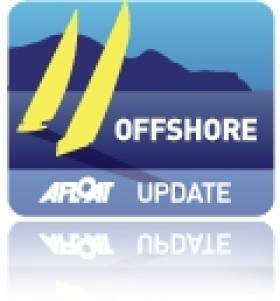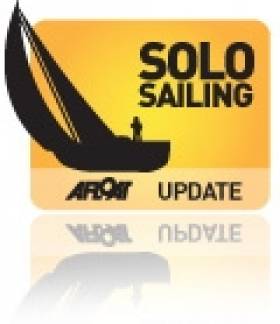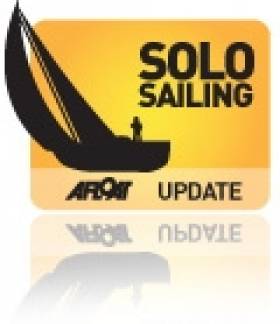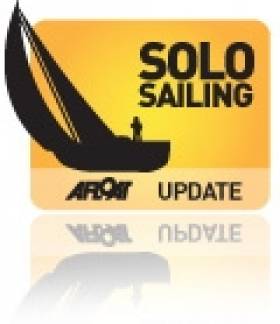Displaying items by tag: Eco 60
€10,000 Up for Grabs in Five Oceans Game
Sailing fans and armchair experts can now compete in their own Ultimate Solo Challenge from the comfort of their own homes with the VELUX 5 OCEANS Virtual Regatta game. What's more, there's €10,000 of prize money up for grabs for the best virtual ocean racers over the course of the 30,000-mile solo yacht race.
The virtual regatta game allows players to race their virtual Eco 60 yachts against the skippers as they sail around the world solo. Players can control their virtual yacht's heading and sail plan as well as which angle to the wind the yacht sails at.
Prizes will be given to the top three virtual skippers on each of the five ocean sprints. €10,000 of prize money will be given out over the course of the race. Players can also win a year-long professional subscription to race suppliers PredictWind, a marine weather forecasting tool, worth €500 as well as a year membership to Sailors for the Sea worth $500.
There will also be prizes for the top ten overall. Here's how the prize money will be broken down:
Each ocean sprint:
1st: €700 + 1 year PredictWind professional subscription
2nd: €350 + 1 year Sailors for the Sea membership
3rd: €100 + Sailors for the Sea hat/newsletter
Overall:
1st: €900 + 1 year PredictWind professional subscription + 1 year Sailors for the Sea full membership + Sailors for the Sea hat/newsletter
2nd: €800 + 1 year PredictWind professional subscription + 1 year Sailors for the Sea full membership
3rd: €600 + 1 year PredictWind professional subscription
4th: €500 + 1 year PredictWind professional subscription
5th: €300 + 1 year PredictWind professional subscription
6th – 10th: €200
Belgian Determined to Make Start Line despite Dismasting
Belgian solo sailor Christophe Bullens was dismasted this morning off the coast of France en route to the start of the Velux 5 Oceans.
The 49-year-old skipper had been sailing his Eco 60 class yacht Five Oceans of Smiles in 18-knot winds and choppy seas 15 miles from the Normandy coast when disaster struck.Christophe was down below with another crewmember while two more crew were on deck. They then heard a snapping noise, thought to have been one of the mast's shrouds breaking. Christophe raced on deck and saw the mast snap in two places. All four crew were able to react in time to avoid the falling mast and no-one was injured.The sails and rigging ended up under the boat, blocking the propeller. CROSS Jobourg, the regional centre for maritime surveillance and safety, dispatched a rescue boat from Cherbourg to aid Five Oceans of Smiles.
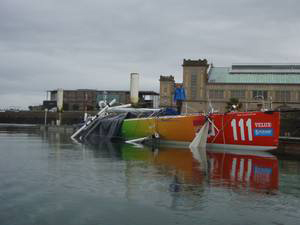
It took more than two hours to prepare Five Oceans of Smiles for the tow back to Cherbourg, which then took three hours.
The dismasting caused serious damage to the starboard side of Five Oceans of Smiles including a hole in the hull by the ballast tanks. The sails are beyond repair. Christophe had been on his way to La Rochelle, home of the 30,000-mile solo ocean race which starts on October 17. The dismasting comes just weeks after he completed a gruelling 2,500-mile qualifying passage from Plymouth in the UK to the southern tip of Ireland then round the Azores off Portugal. During the passage Five Oceans of Smiles was tested in a wide range of weather conditions from strong winds and big seas to light airs. On Christophe's arrival back to Belgium Five Oceans of Smiles' rigging was thoroughly inspected. Earlier this week parts of the rigging were completely replaced. "Nothing is finished," Christophe said after reaching Cherbourg. "I will do everything to be on the startline in La Rochelle on the 17th of October."Christophe's Team Sapphire, aided by the VELUX 5 OCEANS race management team, are now doing all they can to ensure Christophe makes the start of The Ultimate Solo Challenge.
Two Revamped 60s Afloat Ahead of Velux Race
They have spent the last few months hidden away in boatsheds undergoing major transformations – but now two Eco 60 yachts have emerged from their makeovers and have been lifted into the water for the VELUX 5 OCEANS.
Both Brad Van Liew's Eco 60 Le Pingouin and Garry Golding's Oz have made it to the water after months of refitting. Le Pingouin, formerly Pro Form, has been given a stunning golden paint job and proudly sports a penguin logo on its hull. Australian sailor Golding's yacht meanwhile has been transformed from Dee Caffari's yellow and blue Aviva 1 into Oz, with white hull and patriotic gold and green topsides.
Le Pingouin and Oz are the first boats to emerge from the shed as the VELUX 5 OCEANS racers make their final preparations for the 30,000-mile singlehanded race around the world, which starts in La Rochelle, France, on October 17.
"We've redesigned the deck and cabin to suit my sailing style, repainted her with some
awesome and eye-catching graphics, and brought every facet, no matter how minute, up to the highest standards possible for an ocean-going racer," said Van Liew. "This will not only be my home for nine months, but she's my survival pod, my life raft, and will need to keep me safe for 30,000 miles of wild ocean sailing. Our equipment is the best, our shore team is the best, and we're ready."
Golding added: "Getting the boat back in the water is a real milestone for us. It's been really hard work but she looks amazing. We are really proud of Oz and are very grateful to everyone who has helped get her this far."
Golding will step the mast on Oz at the end of the week. Both Van Liew and Golding will then make last minute tweaks to their yachts before setting sail on their qualification passages later this month.
The VELUX 5 OCEANS, run by Clipper Ventures PLC, is the longest running solo round the world race, and has 28 years of rich heritage as the BOC Challenge and then the Around Alone. This edition features five ocean sprints over nine months. After setting off on October 17 from La Rochelle to Cape Town, the race will then take in Wellington in New Zealand, Salvador in Brazil and Charleston in the US before returning back across the Atlantic to France.
Polish Entry into Velux 5 Oceans Race
Zbigniew 'Gutek' Gutkowski has moved one step closer to his goal of becoming the first Polish person to race solo around the world after getting his hands on a high-tech Eco 60 yacht for the VELUX 5 OCEANS. Gutek, one of Poland's best known and most experienced sailors, has spent several months carefully choosing the right boat to take him 30,000 nautical miles around the world in The Ultimate Solo Challenge.
Gutek has settled on Globe, formerly Bagages Superior, one of the most proven Eco 60s on the market. The yacht is a former Vendée Globe winner - in 1991 French solo sailing legend and VELUX 5 OCEANS veteran Alain Gautier steered her to glory. Four years later she returned to the Vendée Globe with Eric Dumont, just missing out on a podium place to finish fourth. Globe is also a veteran of three Transat Jacques Vabre races. In 2000 Globe was rebuilt and five years later she was given a complete overhaul, putting her back at the front line of modern racing yachts.
The next step in Gutek's voyage to the start of the race in La Rochelle, France, on October 17 is to set sail on a qualifying passage. Having taken delivery of the yacht earlier this week, Gutek and his Polish Ocean Racing team are now preparing Globe for her first offshore voyage under his command.
Gutek, 36, said: "I am very pleased to be able to sail Globe around the world in the VELUX 5 OCEANS. The search for the right boat for me has been a long one but it was worthwhile as now I have a great boat that I know will perform and I can trust in her. I am looking forward to getting to know the boat better when I take her on the qualifying passage later this month. After that we will carry our final preparations before sailing to La Rochelle to prepare for the start of the VELUX 5 OCEANS."
No stranger to ocean racing, Gutek was a watch captain onboard WARTA-POLPHARMA in The Race, the non-stop race around the world for multihulls. In 2005 he skippered the ORMA 60 Bonduelle in the Nokia Oops Cup. He also attempted to break the monohull record for a non-stop circumnavigation onboard the Volvo 60 Bank BPH (formerly ASSA ABLOY), but damage forced the crew to Cape Town after 9,500 miles.
The VELUX 5 OCEANS, run by Clipper Ventures PLC, is the longest running solo round the world race, and has 28 years of rich heritage as the BOC Challenge and then the Around Alone. This edition features five ocean sprints over nine months. After heading from La Rochelle to Cape Town, the race will then take in Wellington in New Zealand, Salvador in Brazil and Charleston in the US before returning back across the Atlantic to France.


























